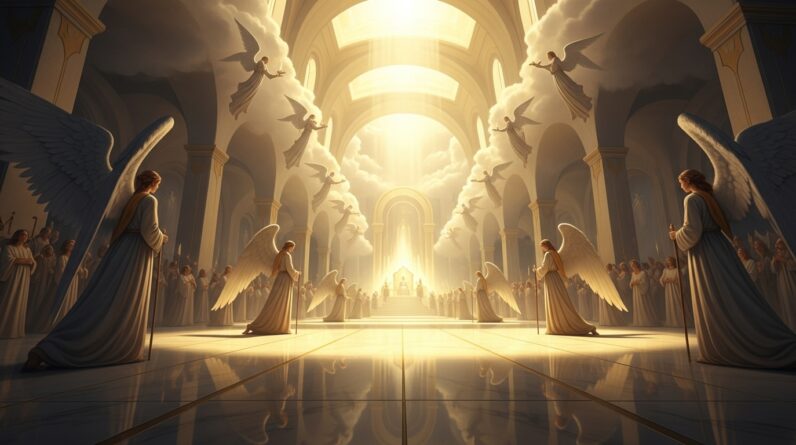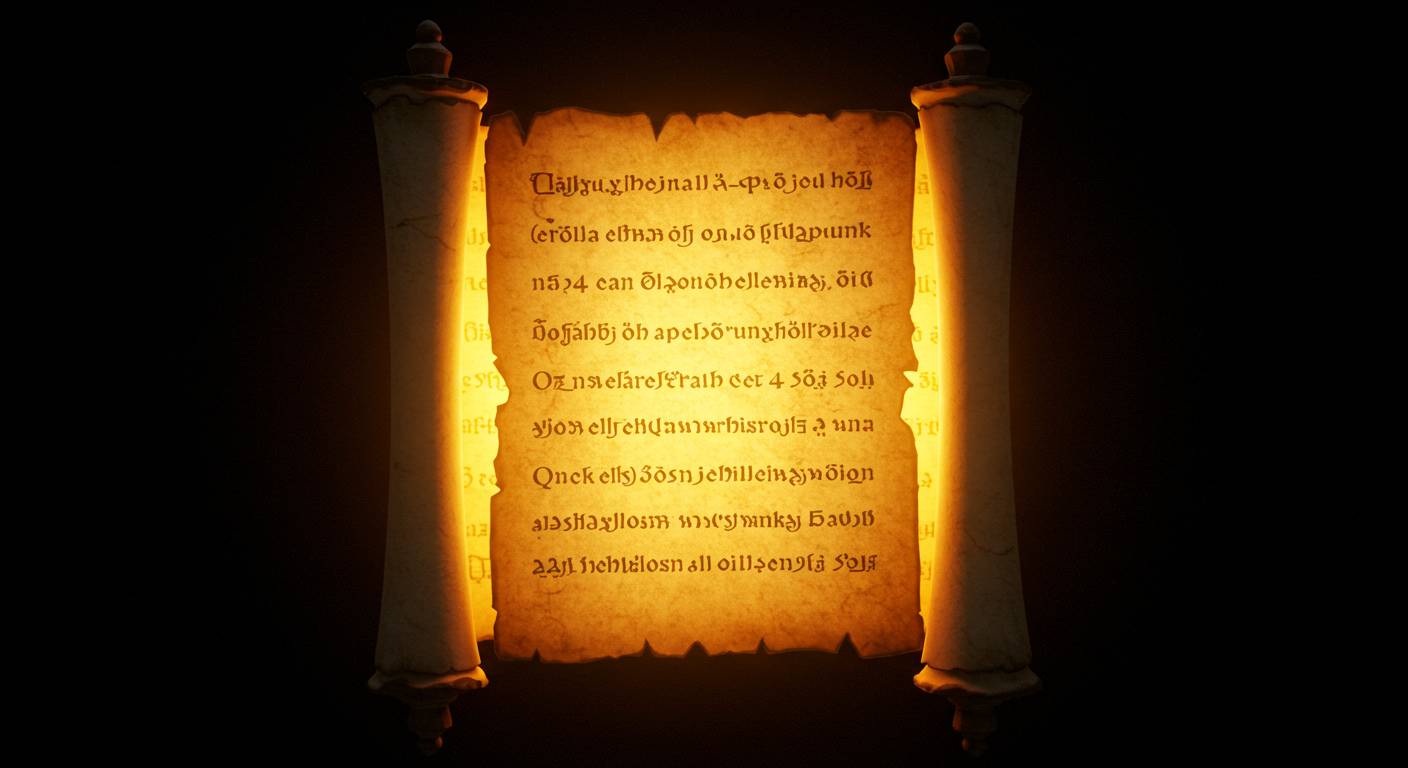Explore Revelation 18:2 with a modern interpretation of Babylon’s fall, capturing the tension between worldly ambition and divine justice, relevant to today’s reader.
The Fall of Babylon: The Downfall of a Worldly Empire — Revelation 18:2
Bible Verse: Revelation 18:2 – “And he cried mightily with a strong voice, saying, Babylon the great is fallen, is fallen, and is become the habitation of devils, and the hold of every foul spirit, and a cage of every unclean and hateful bird.”

Introduction: Setting the Scene
Picture this: a grand, bustling city filled with opulence, bustling markets, and vibrant life. Yet beneath its shimmering surface lies a dark underbelly of corruption and idolatry. This is Babylon, the symbolic center of worldly excess and moral decay. In the book of Revelation, the dramatic fall of Babylon serves as a stark warning of the inevitable downfall of empires that stand against God’s righteousness.
The apocalyptic vision detailed in Revelation 18:2 gives us a vivid portrayal of this eventual destruction. Babylon, the earthly stronghold of wickedness, is shown succumbing to divine judgment. For you as a reader, this vision not only unravels the prophetic events leading to this collapse but also illuminates profound spiritual truths relevant to believers today.
Why It Matters
Why does the vision of Babylon’s fall matter, you might ask? It’s crucial because it transcends its ancient context, speaking directly to the spiritual and moral dynamics at work in the lives of believers today. Babylon represents more than just a city; it is a metaphor for any society or entity that elevates itself against God’s will and truth.
The narrative of Babylon’s fall is a bold declaration of God’s ultimate authority and justice. It serves as both a caution and a comfort—a warning against aligning with worldly corruption while assuring believers of God’s sovereign plan. This dynamic tension within the vision makes it timeless and universally significant, especially in a world where spiritual and ethical challenges are ever-present.
Exploring the Vision in Depth
Summary of Key Symbols
Revelation 18:2 is rich with symbolic imagery, each element intricately woven to convey profound truths. Babylon, in its grandeur, symbolizes human ambition, pride, and a worldly empire built on power and exploitation. The “habitation of devils” and “foul spirits” underscore the moral corruption and spiritual desolation beneath its imposing exterior.
Each symbol within this vision carries weight. The descriptions of “unclean and hateful birds” allude to decay and filth, painting a picture of Babylon’s spiritual bankruptcy. Together, these symbols illustrate the inevitable collapse of any system or empire that defies divine law and contributes to spiritual bondage.
Contextual Background
To fully appreciate the fall of Babylon, it’s important to understand its historical and theological context. Historically, Babylon was a powerful ancient city located in what is now modern-day Iraq. A symbol of opulence and arrogance, Babylon frequently appears in Biblical literature as an antagonist to God’s people.
Theologically, Babylon’s recurrent role as a symbol of evil goes back to Genesis and the Tower of Babel, representing humanity’s rebellious attempt to assert independence from divine rule. Within the narrative of Revelation, Babylon’s fall is a climax heralding the end of a long-standing cosmic conflict between good and evil, highlighting God’s unwavering justice.
Interpretation
What does this vision mean for us? Essentially, the fall of Babylon is a testament to the ultimate futility of human pride and worldly entanglements. The imagery of devils, foul spirits, and unclean birds encapsulates the spiritual bankruptcy that accompanies any system that opposes God.
Revelation 18:2 is not just about a physical collapse; it’s about the spiritual consequences that arise when societies forsake divine principles. It reinforces the theme woven throughout Revelation: that despite appearances, God’s purpose and power are unassailable, and His judgment is inevitable on unrepentant evil.
Relevance for Today’s Readers
Spiritual Insight
The fall of Babylon offers a poignant reminder for today’s spiritual journey. In an age beset by materialism, moral relativism, and power struggles, this vision beckons you to reflect on your alignment—are you pursuing worldly success at the expense of spiritual integrity?
The vision encourages trust in God’s sovereignty and affirms that while earthly powers may rise and fall, God’s kingdom stands immutable. It’s a call to faithfulness amid the noise of worldly distractions, urging believers to anchor their lives in God’s eternal truth rather than temporary allurements.
Application in Daily Life
How can this vision shape your daily life? It invites you to evaluate your priorities and consider the values you are building your life upon. Are you investing in things that sustain spiritual growth, or are you drawn to the transient temptations of “Babylon” in your world?
This prophetic vision encourages you to model Christ-like behaviors such as humility, justice, and love, resisting the gravitational pull of societal pressures that compromise these virtues. Let it be a reminder that authentic and enduring success lies in aligning with God’s purpose and living out His principles in everyday actions.

Supporting Verses and Cross-References
To deepen your understanding of this powerful vision, consider these related verses that resonate with the fall of Babylon:
- Ephesians 6:12 — “For our struggle is not against flesh and blood but against … spiritual forces of evil.”
- Isaiah 13:19 — “Babylon, the jewel of kingdoms, the glory of the Babylonians’ pride, will be overthrown by God like Sodom and Gomorrah.”
- Jeremiah 51:58 — “This is what the LORD Almighty says: ‘Babylon’s thick walls will be leveled and her high gates set on fire; the peoples exhaust themselves for nothing, the nations’ labor is only fuel for the flames.’”
These verses provide a broader scriptural framework that emphasizes the consistent biblical narrative of God’s judgment on pride and rebellion, underscoring the transient nature of human kingdoms.
Conclusion: Reflection on the Vision’s Message
Reflecting on the fall of Babylon, one realizes it’s more than a historical account; it’s a spiritual lesson that transcends time. The grandeur of Babylon and its subsequent downfall remind us of the temporal nature of human ambition and the enduring certainty of God’s reign.
In the arc of your spiritual journey, this vision is a powerful invocation to stand steadfast in faith, embracing the eternal over the ephemeral. Through moments of trial and ambiguity, take solace knowing that God’s power and justice will ultimately prevail, signaling hope and reassurance in His divine plan.
I encourage you to meditate on this vision’s profound truths, allowing them to inform your perspective and strengthen your resolve. The call to faith is strong—turn to God’s Word for wisdom and guidance as you navigate your own path, secure in the promise of His ultimate victory.
To delve deeper, consider these closing words from Revelation 21:4 — “He will wipe every tear from their eyes. There will be no more death or mourning or crying or pain, for the old order of things has passed away.” A beautiful reminder of the new beginning promised in God’s everlasting kingdom.







